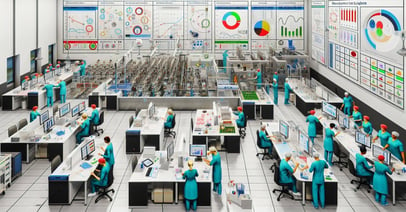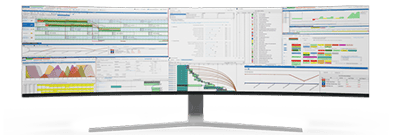Topics: Real-time Visibility, Data Accuracy, PlanetTogether Software, Better Decision-Making, Integrating PlanetTogether, Enhanced Collaboration, Real-Time Synchronization, Process Efficiency, Holistic Supply Chain Visibility, Medical Manufacturing
The importance of production scheduling cannot be overstated in medical manufacturing. As a Purchasing Manager in a medical manufacturing facility, you understand the delicate balance between meeting tight deadlines, ensuring quality standards, and optimizing resources. In today's fast-paced environment, the integration of advanced technologies like Enterprise Resource Planning (ERP), Supply Chain Management (SCM), and Manufacturing Execution Systems (MES) is essential to achieving multi-objective production scheduling.
This blog aims to explore the challenges faced by purchasing managers in medical manufacturing, the benefits of multi-objective production scheduling, and the role of integration between PlanetTogether, a leading production scheduling software, and prominent ERP, SCM, and MES systems like SAP, Oracle, Microsoft, Kinaxis, and Aveva.

Medical manufacturing is characterized by its unique challenges, including stringent regulatory requirements, varying demand patterns, complex supply chains, and the need for just-in-time production. These challenges pose significant hurdles for purchasing managers tasked with ensuring efficient use of resources while meeting production goals.
Some common challenges include:
Regulatory Compliance: Strict regulations govern the production of medical devices and equipment, requiring adherence to quality standards, documentation, and traceability throughout the manufacturing process.
Demand Variability: Fluctuating demand for medical products adds complexity to production scheduling, leading to issues like overproduction, stockouts, and increased inventory costs.
Resource Optimization: Balancing the utilization of equipment, labor, and materials while minimizing idle time and production bottlenecks is crucial for maximizing efficiency and profitability.
Lead Time Management: Managing lead times for raw materials, components, and finished goods is essential for meeting customer demands and avoiding delays in delivery.
Production Complexity: Medical manufacturing often involves intricate processes, multiple production lines, and specialized equipment, making scheduling decisions more intricate.

Multi-objective production scheduling involves optimizing various conflicting objectives simultaneously, such as minimizing production costs, maximizing throughput, reducing lead times, and meeting delivery deadlines. Traditional scheduling methods often focus on a single objective, leading to suboptimal solutions.
Improved Efficiency: By considering multiple objectives, scheduling algorithms can identify trade-offs and find solutions that maximize overall efficiency.
Enhanced Flexibility: Multi-objective scheduling allows for better adaptability to changes in demand, resource availability, or production constraints.
Cost Reduction: Optimized scheduling can help minimize overtime, reduce inventory holding costs, and improve resource utilization, leading to significant cost savings.
Better Customer Service: Meeting delivery deadlines and ensuring product availability can enhance customer satisfaction and loyalty.
Compliance Assurance: Scheduling algorithms can incorporate regulatory constraints and quality requirements to ensure compliance throughout the manufacturing process.
![]()

Integration between production scheduling software like PlanetTogether and ERP, SCM, and MES systems is critical for streamlining operations and achieving seamless data exchange across the organization.
ERP Integration: Integration with ERP systems such as SAP, Oracle, or Microsoft Dynamics enables real-time synchronization of production schedules with enterprise-wide data on inventory levels, sales orders, procurement, and financial transactions. This integration facilitates better decision-making, resource planning, and order fulfillment.
SCM Integration: Linking production scheduling with SCM systems like Kinaxis allows for holistic supply chain visibility, from raw material procurement to final product delivery. This integration enables optimized inventory management, supplier collaboration, and demand forecasting, ensuring a smooth flow of materials throughout the supply chain.
MES Integration: Integration with MES systems like Aveva enhances shop floor control and execution, enabling real-time monitoring of production activities, machine status, and quality metrics. MES integration ensures that scheduled production tasks are executed efficiently, with adherence to standard operating procedures and quality standards.
Real-time Visibility: Integration provides real-time access to critical data across the manufacturing ecosystem, enabling stakeholders to make informed decisions and respond promptly to changes.
Data Accuracy: By eliminating manual data entry and synchronizing information across systems, integration reduces errors and ensures data accuracy throughout the production process.
Process Efficiency: Integrated systems streamline workflows, automate repetitive tasks, and eliminate redundant processes, leading to improved operational efficiency and productivity.
Enhanced Collaboration: Integration fosters collaboration between departments by facilitating seamless communication and sharing of information, fostering a culture of teamwork and alignment towards common goals.
In the dynamic landscape of medical manufacturing, achieving optimal production scheduling is imperative for meeting customer demands, maintaining regulatory compliance, and maximizing profitability. Purchasing managers play a crucial role in orchestrating the efficient use of resources and ensuring smooth operations across the supply chain.
By embracing multi-objective production scheduling and integrating advanced technologies like PlanetTogether with ERP, SCM, and MES systems, medical manufacturing facilities can overcome challenges, optimize efficiency, and deliver high-quality products to market effectively.
Investing in robust scheduling solutions and fostering collaboration between different stakeholders will pave the way for success in the competitive world of medical manufacturing.
As a Purchasing Manager, your role in championing these initiatives will be instrumental in driving organizational excellence and achieving sustainable growth. Are you ready to take your manufacturing operations to the next level? Contact us today to learn more about how PlanetTogether can help you achieve your goals and drive success in your industry.
Topics: Real-time Visibility, Data Accuracy, PlanetTogether Software, Better Decision-Making, Integrating PlanetTogether, Enhanced Collaboration, Real-Time Synchronization, Process Efficiency, Holistic Supply Chain Visibility, Medical Manufacturing
0 Comments
No video selected
Select a video type in the sidebar.







LEAVE A COMMENT